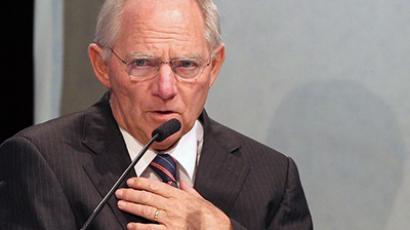Europe of discord: What will become with euro in 2013?

As the European debt crisis shows no signs of ending experts are divided on whether the Eurozone is doomed or the project is viable, even if some of its member drop out of the euro.
“The eurozone is headed for deeper, more intense, and much less retractable trouble in 2013. There is no foreseeable way for the region to recover as it exists today in its current form,” economic expert Margaret Bogenrief from ACM Partners told RT.With Greece’s exit from the Eurozone looming and a lack of agreement between EU leaders on crisis fighting measures, the region’s economy was on the verge of collapse several times last year.
Root of the Greece
In 2012 America’s Citigroup raised the chances of Greece leaving the euro in the next year to 90%."Over the next few years, the euro area end-game is likely to be a mix of EMU exit (Greece), a significant amount of sovereign debt and bank debt restructuring (Portugal, Ireland and, eventually, perhaps Italy, Spain and Cyprus) with only limited fiscal burden-sharing,” Citigroup said in its July report.Since 2009 when Greece’s economy began falling apart under its huge debt burden the country has been dependent on international rescue loans with a total of €240 billion provided to Athens. As of now, €149 billion have been distributed to Greece from the Troika of international lenders.That hardly solves all of Greece’s problems, and experts seriously considered the scenario of Greece’s default and probable exit from the Eurozone. According to the ECB it would be manageable but very expensive, not only for the crisis-troubled country, but for the whole region.“It would be associated with a loss of growth and higher unemployment and it would be very expensive – in Greece, Europe as a whole and even in Germany,” ECB policymaker Joerg Asmussen said in August.His view is echoed by economic experts. "Despite Greece receiving a commitment of 2 bailouts (totaling 240 bn euro from the EU, European Commission, and IMF), an implementation of strict austerity measures, and the Eurozone’s agreement to cut the country’s debts by a further 40bn euro, Greece’s debt-to-GDP level is still predicted, as a best case scenario in 2020, to hit 124%," Bogenrief told RT.She added: "The EU has stretched itself to its near limit (in particular by having to request aid for outside sources, such as the IMF) merely keeping Greece (the 15th largest economy in the EU) within its economic borders".By the end of the year Greece managed to gain back investor confidence. Standard & Poor's ratings agency upgraded Greece’s credit grade to a B-, the highest since June 2011, although the bonds are still at junk status. Athens successfully accomplished a bond buyback, and reduced its debt by €20 billion. Trying to hold control of the economy at the end of 2012 Greece adopted a 2013 budget that involves €9.4 billion of spending cuts, mainly in state wages, pensions and benefits, all of which have already been significantly reduced over the past two years. The decision resulted in strikes and protest across the country. Tough austerity measures have also led to a drastic surge of unemployment – in the third quarter of 2012 it reached a record 24.8%, up from 17.7% during the same period in 2011.Greece’s neighbor Cyprus also found itself on the verge of default, crippled by the losses on Greek bonds. S&P slashed Cyprus' credit rating by two notches to CCC+ last December. Cyprus's request for an EU bail-out, which could amount to €17.5 billion, will be considered by eurozone finance ministers in Brussels on 21 January. Cyprus’s President has already said the international aid could cost the country its financial sovereignty. Earlier in 2012 the island nation got a €2.5 billion loan from the Russian government. Then three major companies provided the government with a €175m loan to stay afloat.European creditors EU, IMF and ECB, said they consider a further reduction of Greece’s debt if the country manages to achieve a significant primary surplus by 2016. Earlier they agreed to cut Greece’s debt by €40 billion, reducing it to 124% of GDP by 2020 from around 190% in 2013.
Hard times not over
Europe saw its public debt reach 90% of the value of the union's economy at the end of the second quarter of 2012, according to the data provided by Eurostat. Meanwhile the total jobless rate in the eurozone reached a record high of 11.7%, meaning 19 million people in the bloc were out of work with Southern member countries among the worst affected.Experts warn that though the situation in Greece is under better control now, the crisis still poses risk to euro stability.“Unfortunately, the eurozone crisis is likely to remain with us for years to come, sustaining the likelihood of coercive debt restructurings and eurozone exits,” Nouriel Roubini, a professor at NYU’s Stern School of Business wrote in his article for Project Syndicate in December. “The fundamental crisis of the eurozone has not been resolved, and another year of muddling through could revive these risks in a more virulent form in 2014 and beyond,” Roubini said, citing ‘Grexit’ and probable massive loss of market access in Italy and Spain.So far the debt-stricken countries are determined to continue unpopular austerity reforms which have already resulted in mass protests across Southern Europe throughout 2012. The looming multi-billion bailout for Spain, Europe’s fourth largest economy, has become a major headache for the eurozone. Last September Spain announced its plan for drastic economic reform, and a tight 2013 budget which includes 58% spending cuts and 42% increase in taxes. As the Spanish crisis spread several regions asked for bailout, while Catalonia, the country’s richest region accounting for fifth of GDP turned down “participation in the liquidity fund,” the 18bn euro body set up by Madrid to finance troubled regions and called for independence.
Saving the euro
In 2012 eurozone countries managed to agree on two ambitious initiatives aimed at keeping the Eurozone afloat – the establishment of a European stabilization fund and a banking union. The two instruments will be operational in various spheres: the European stabilizing fund will offer help to weak economies pumping money from the strong ones. EU has also agreed to appoint the ECB the single regulator for the biggest banks in the euro zone as a step towards a "banking union," or common euro area approach to dealing with failing banks.The only thing which European politicians do not want to do is to let debt-stricken countries carry out free floating. However, here they are pursuing their selfish interests, Chief of the Analytical Department of the IK Grandis Capital Denis Barabanov told the Voice of Russia."The strong countries of the eurozone are getting big preferences and advantages as the members of the eurozone because on the one hand, they are killing rivalry in weaker countries and on the other hand, they always have a reliable and profitable commodity market, which enables them to sell highly competitive goods within the framework of their union," Barabanov said.With all the efforts, even optimistic experts don’t expect the Europe’s economy to recover in the near future. In its new paper “New Recession in the Eurozone” S&P rating agency suggests the eurozone GDP will shrink by 0.8% in 2012. Growth in 2013 is expected to be zero compared to the earlier forecast of up 0.3%, according to the study.Splitting the eurozone is still considered to be an option by some experts. Billionaire George Soros proposed Germany, Europe’s so far best performing economy, should leave to save the Eurozone, among other options. "The problem would disappear into thin air," as the value of the euro declines and yields on the bonds of debtor countries adjust, CNBC quoted Soros as saying. On the other hand, euro-sceptic and financial consultant Stephan Werhahn, grandson of a statesman seen as the architect of the EU, believes the euro should be limited to a handful of similar northern European countries, the Daily Mail reports. "Europe will fail' if debt-stricken countries are forced to stick with the euro," Werhahn said.However, Italy, Greece and Spain are very unlikely to leave the Eurozone, according to Maksim Zaytsev, senior analyst at Nord Capital Group. “They have made significant progress over the recent months in reducing their budget deficit,” Zaytsev told RT. “Now their budget gaps are lower than 9% – a critical level when countries face problems with debt refunding.”The ECB has also contributed to easing the situation in Europe, he added. “ECB launched a bond-buying program which also supported debt markets,” Zaytsev said. “This program allows the ECB to buy bonds without limits while setting aside some funds to avert a risk of inflation.” The 700bn euro European Stability mechanism is also very important as it de facto issues euro bonds supported by all.















